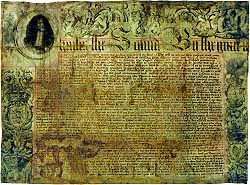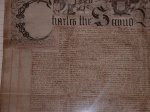
This will mean that there will be two Charles II patents (or charters) on display in the state of Pennsylvania.
Royal Patents are important legal documents, often elaborately decorated and illuminate d, in which the monarch grants permission to subjects or institutions for specific purposes requiring royal approval. Charles II wrote many patents during his reign, often in regard to new settlements in the colonies, but not all of them…
d, in which the monarch grants permission to subjects or institutions for specific purposes requiring royal approval. Charles II wrote many patents during his reign, often in regard to new settlements in the colonies, but not all of them…
The important provisions of the RML Patent are as follows:
1. Davenant may maintain his already existing company, to be called ”The Duke’s Men”.
2. Davenant and Killigrew have the sole authority to present theatrical productions (a real monopoly: ”We …declare all other…companies…to be silenced and suppressed.”)
3. Davenant is permitted to erect a new theater on the site he is using now or elsewhere in the city under the patronage of James, Duke of York.
4. Davenant is allowed to charge the going rate of admission at this new theater in order to meet ”the great expense of scenes, music and such decorations as have not been formerly used.”
5. woman’s roles may be legally performed by women
6. no play shall be acted containing passages ”offensive to piety and good manners”
This patent was purchased by the Rosenbach Company in August 1927 from the grandson of a 19th-century leaseholder of the Covent Garden Theater.
